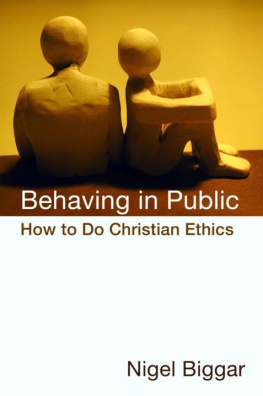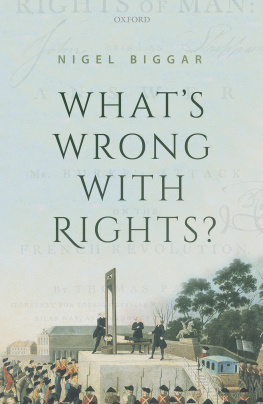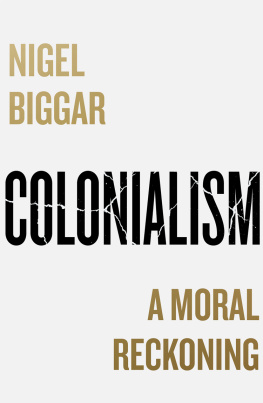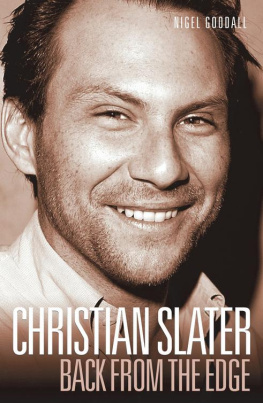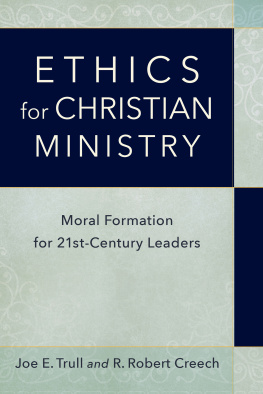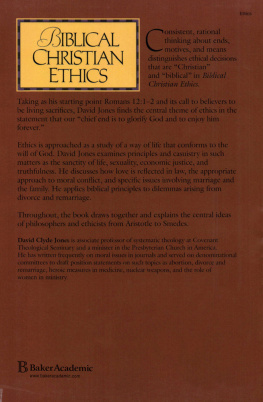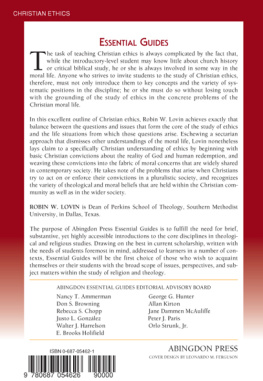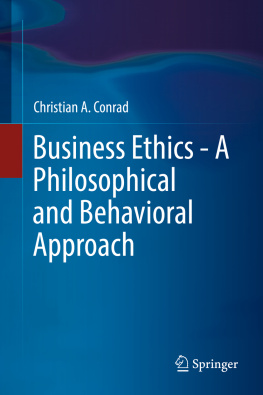Nigel Biggar - Behaving in Public: How to Do Christian Ethics
Here you can read online Nigel Biggar - Behaving in Public: How to Do Christian Ethics full text of the book (entire story) in english for free. Download pdf and epub, get meaning, cover and reviews about this ebook. year: 2011, genre: Religion. Description of the work, (preface) as well as reviews are available. Best literature library LitArk.com created for fans of good reading and offers a wide selection of genres:
Romance novel
Science fiction
Adventure
Detective
Science
History
Home and family
Prose
Art
Politics
Computer
Non-fiction
Religion
Business
Children
Humor
Choose a favorite category and find really read worthwhile books. Enjoy immersion in the world of imagination, feel the emotions of the characters or learn something new for yourself, make an fascinating discovery.
- Book:Behaving in Public: How to Do Christian Ethics
- Author:
- Genre:
- Year:2011
- Rating:4 / 5
- Favourites:Add to favourites
- Your mark:
- 80
- 1
- 2
- 3
- 4
- 5
Behaving in Public: How to Do Christian Ethics: summary, description and annotation
We offer to read an annotation, description, summary or preface (depends on what the author of the book "Behaving in Public: How to Do Christian Ethics" wrote himself). If you haven't found the necessary information about the book — write in the comments, we will try to find it.
Behaving in Public: How to Do Christian Ethics — read online for free the complete book (whole text) full work
Below is the text of the book, divided by pages. System saving the place of the last page read, allows you to conveniently read the book "Behaving in Public: How to Do Christian Ethics" online for free, without having to search again every time where you left off. Put a bookmark, and you can go to the page where you finished reading at any time.
Font size:
Interval:
Bookmark:

How To Do
CHRISTIAN ETHICS
Nigel Biggar
Xi
xiii
xv
In writing this book I have received help from several quarters.
First of all, Jon Pott, editor-in-chief at the Wm. B. Eerdmans Publishing Company, put an idea into my mind - during the 2008 meeting of the Society for Christian Ethics - that grew into this book. Then, since the autumn of 2008, Alonzo McDonald and the McDonald Agape Foundation have generously supported my work through the establishment of the McDonald Centre for Theology, Ethics, and Public Life at the University of Oxford.
The original drafts of the first four chapters of Behaving in Public comprised the Centre's inaugural series of McDonald Lectures in February 2009. Thanks to the initiative of Dr. John Perry, the new McDonald postdoctoral fellow in Christian Ethics and Public Life, I was able to learn from the reactions of the Oxford postgraduates in Christian ethics who congregated in the Head of the River pub on March 5, 2009: Therese Feiler, Guido de Graaff, Rob Heimburger, Chris Jones, Tom Kirby, and Phil Lorish.
On September 3, the same nascent chapters were the subject of discussion at the annual meeting of the McDonald Centre's Public Discourse Group in the Red Bull pub in Cambridge. Those present were Mark Bratton, Malcolm Brown, Jonathan Chaplin, Neil Messer, Esther Reed, and Robert Song. Christopher insole was absent, but he sent comments afterward.
On September 22, I was privileged - thanks to the recommendation of Robin Lovin - to deliver an abbreviated version of chapters 1 through 4 as the 2009 Willis M. Tate-Willson Lectures at Southern Methodist University. My SMU colleagues were unstinting in their hospitality. Later in the autumn, Esther Reed commented on the first draft of chapter 5, and Dave Leal and David Clough reviewed a complete draft of the whole book.
To all these friends and colleagues - for their various investments, their candor, and their encouragement - I am enormously grateful.
Certain passages in Chapters 1, 2, 3, and 5 have been drawn, in more or less modified form, from previously published work of mine: The Hastening That Waits: Karl Barth's Ethics (Oxford University Press, 1995), pp. 147-51; "Karl Barth and Germain Grisez on the Human Good: An Ecumenical Rapprochement," in The Revival of Natural Law: Philosophical, Theological, and Ethical Responses to the Finnis-Grisez school, ed. Nigel Biggar and Rufus Black (Ashgate, 2000), pp. 176-79; "Saving the Secular: The Public Vocation of Moral Theology," Journal of Religious Ethics 37.1 (March 2009): 170-72; and "Not Translation, but Conversation: Theology in Public Debate about Euthanasia," in Religious Voices in Public Places, ed. Nigel Biggar and Linda Hogan (Oxford University Press, 2009), pp. 166-70, 171-72. This material reappears here with the kind permission of Oxford University Press, Ashgate Publishing, and John Wiley and Sons.
There I was (pleasantly) surprised to discover Jim's pursuit of a middle course that anticipates my own by thirty-five years.
Finally, it strikes me that in his combination of human and spiritual seriousness, theological convic tion ("Say something theological!"), and honest engagement with other sciences, Jim has actually embodied much of the model of Christian ethics that I have sought to recommend in these pages. For all these reasons, therefore, it is fitting that I record my gratitude to him here, and I do it gladly.
What follows is a view from somewhere.
Itwas the winter of 1973, and I was in myvery first term as an undergraduate reading Modern History at Oxford. Huddled over the desk in my room in the dark morning hours, I was straining to prepare for my first set of exams by candlelight, since the electricity-generating stations had shut down, their fuel supply cut off by striking coalminers. My tea was not sweet, as I preferred, since the dockyard workers were also on strike, and imported sugar was impossible to find. The radio was heavy with news about the latest bombings and shootings in Northern Ireland, where the violence was then at its height. And the London Times was running a series of leading articles under the title "Is Britain Governable?" Like everyone else - except perhaps for those on the hard left, who were gleeful about the revolutionary opportunities of economic and political chaos - I was anxious and concerned. And as a recent convert to Christianity, I wondered what on earth my newfound faith had to say to such a national crisis.
Three years later the crisis had passed, but the political strife rumbled on. I was now in the final year of my undergraduate studies and I had opted to take a specialist course on the life and times of Saint Augustine, in which large tracts of The City of God (in Latin) were prescribed. Here I found another Christian who was trying to make sense of turbulent times in which the known world seemed to be falling down about his ears. Nothing in the history curriculum had commanded my attention as this did. I was thoroughly hooked.
Fifteen months later I started my first theology degree.
My interest in Christian theology and ethics, therefore, has never been simply academic. From the very beginning, my theological study has been driven by a desire - which has gradually revealed itself as a vocation - to put myself in the position of being able to speak in the world at once with Christian integrity and with practical wisdom.
Accordingly, as a doctoral student I was drawn to the thought of Karl Barth by the prospect of learning from a Christian vision of moral and political life that is theologically comprehensive (as well as basically orthodox). I was not disappointed. Nevertheless, I did find myself dissatisfied at the indeterminate way in which Barth's theologically generated ethical concepts often hover frustratingly above the concrete earth of complex moral and political problems, or at the sometimes haphazard manner of his leaping from theological premise to moral rule or concrete judgment. Hence my simultaneous attraction to Scholastic methodicality and casuistry.
My dissatisfaction with much post-Barthian Christian ethical thinking runs along parallel lines. It seems to me that recent Christian ethics has tended to be strong in its determination to achieve theologically critical distance from what passes for common moral sense by immersing itself in the traditions of Christian moral thought. It has often performed poorly, however, at bringing the resources of its historical mining to engage at close, honest, and considerate quarters with present issues of public policy. It is true, of course, that engaging with public policy is not the only way of causing Christian faith to shape the world for good. Arguably, it is more important to foster an alternative ethos within the churches, which can show forth what salutary social and political life looks like. Nevertheless, the rest of the world is being daily misshapen by decisions about public policy, and Christian ethics should care to reserve some of its energy for engaging critically and constructively with those, too.
Font size:
Interval:
Bookmark:
Similar books «Behaving in Public: How to Do Christian Ethics»
Look at similar books to Behaving in Public: How to Do Christian Ethics. We have selected literature similar in name and meaning in the hope of providing readers with more options to find new, interesting, not yet read works.
Discussion, reviews of the book Behaving in Public: How to Do Christian Ethics and just readers' own opinions. Leave your comments, write what you think about the work, its meaning or the main characters. Specify what exactly you liked and what you didn't like, and why you think so.

